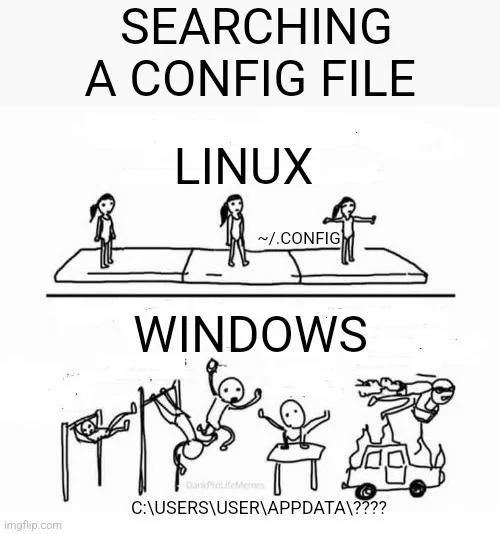Shrug don't remember the last time I actually needed to modify a system config file on Windows...
linuxmemes
Hint: :q!
Sister communities:
- LemmyMemes: Memes
- LemmyShitpost: Anything and everything goes.
- RISA: Star Trek memes and shitposts
Community rules (click to expand)
1. Follow the site-wide rules
- Instance-wide TOS: https://legal.lemmy.world/tos/
- Lemmy code of conduct: https://join-lemmy.org/docs/code_of_conduct.html
2. Be civil
- Understand the difference between a joke and an insult.
- Do not harrass or attack members of the community for any reason.
- Leave remarks of "peasantry" to the PCMR community. If you dislike an OS/service/application, attack the thing you dislike, not the individuals who use it. Some people may not have a choice.
- Bigotry will not be tolerated.
- These rules are somewhat loosened when the subject is a public figure. Still, do not attack their person or incite harrassment.
3. Post Linux-related content
- Including Unix and BSD.
- Non-Linux content is acceptable as long as it makes a reference to Linux. For example, the poorly made mockery of
sudoin Windows. - No porn. Even if you watch it on a Linux machine.
4. No recent reposts
- Everybody uses Arch btw, can't quit Vim, and wants to interject for a moment. You can stop now.
Please report posts and comments that break these rules!
For Linux applications that respect XDG? Sure. There are plenty that don't because they either predate that specification, or they just don't care. Linux filesystems are generally much faster at executing reads on many small files, meaning fast search tools like ripgrep and fd make it so I don't really have to care. They'll run through my whole $HOME in 5 seconds flat. There's also stuff like locate, although I don't like maintaining an index. SSDs are so damn fast that I can just rg --hidden --glob '*.toml' 'the_setting_i_want_to_change' ~/ whenever I want.
To be fair sometimes configs instead of XDG_CONFIG_HOME(~/.config) are stored in XDG_DATA_HOME(~/.local/share)
Have you found appdata/local/Application Data? It's a "conjunction point" that you can only find via the command line, and only exists for backwards compatibility. It points to appdata/... Do not EVER try to gain access over all your files in appdata/. It'll break due to that conjunction point.
To this day, I still don't know how to set a path variable permanently in any Linux distro
I do feel like setting environment variable on linux is not as intuitive as on windows, but after I setup my workflow, I realized I never have the need to manually set any environmental variable besides in flatseal.
Maybe you have a specific use case for it?
